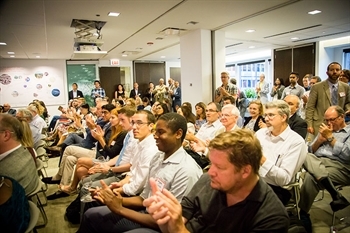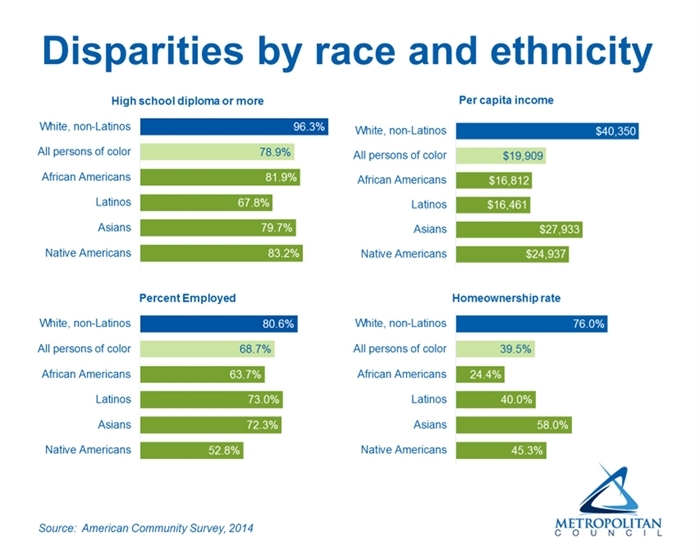This post was co-authored by MPC Research Assistant Quentin Shipley-Mellon
Last year, Chicagoland experienced the greatest population loss of any metropolitan area in the country. Meanwhile, our colder-weather neighbors to the north, Minneapolis and St. Paul, are booming. The Twin Cities Metro Region is growing six times faster than Chicagoland and Minneapolis is growing at a rate eight times greater than the City of Chicago.

July 14 Urban Think & Drink Audience
What’s going on in Minnesota? More than 113 eager and attentive people joined MPC’s July 14 Urban Think & Drink to find out. MPC invited former Twin Cities Metropolitan Council chair and current president & CEO of Twin Cities Habitat for Humanity Susan Haigh to shed light the current state of the Twin Cities and the region’s future.
Haigh said that most new residents are moving to the Twin Cities for jobs. According to the Bureau of Labor Statistics, the current unemployment rate stands at only 3.1 percent, compared to 5.4 percent in Chicagoland. Haigh told the audience, businesses locate there because of the highly educated workforce (“93 percent of adults have a high school diploma or equivalent”), and the generally high quality of life and lower cost of living for residents.
Their population and economic growth did not happen overnight. To reach the region's current state, business and civic organizations in the Twin Cities planned for and invested in the strength of the entire region. The Metropolitan Council—known as the “Met Council”—was one entity that forged a path for growth.
Planning for sensible growth: The Met Council
The Met Council was created in 1967 in the face of intense regional challenges: inadequately treated wastewater, a failing privately-owned bus company, development on sensitive natural areas, and fiscal disparities that left cities and towns fighting against each other for economic development.

Susan Haigh
The Met Council promotes an equitable, sustainable and economically competitive region through a comprehensive long range plan, Thrive MSP 2040. Their planning process coordinates strategic investments in transportation, water resources, parks, open space and housing.
Susan Haigh asked, “What teeth does our regional plan really have?” To ensure the plan becomes a reality, the Metro Council awards funding, like Livable Communities Grants, to projects that align with Thrive.
The Met Council is also the region’s transportation planner and operator, allowing the region to grow a transit system that many would envy. Investments in light rail and bus rapid transit have been a strong driver for economic development. According to Susan, the region has seen:
-
15,000 units of new housing around the Blue Line light rail
-
$237 million in new development around Red Line bus rapid transit
-
$4 billion in new investment around the recently opened Green Line light rail
Challenges ahead: Addressing inequality
While Susan’s remarks emphasized that the region is generally prosperous, the benefits of economic development have not been evenly felt for all people in her region. Among metropolitan areas in the United States, the Twin Cities frequently ranks number one in measures of inequality. The Twin Cities has extremely high disparities between whites and people of color when comparing employment, homeownership and highschool graduation rates.

Met Council
Slide from Haigh's July 14 Presentation
Haigh emphasized, equity is not only “a social justice issue, but rather an economic issue for our entire region.” That is why, Susan noted, local business leaders and CEOs are discussing ways to promote equity within regional groups like the Itasca Project and Greater MSP, the region’s branding and economic development nonprofit.
Susan emphasized, “We have to talk about racial equity and be serious about it. Everyone has to benefit from economic growth.” Educational and economic disparities are particularly salient, given that by 2040, the percentage of people of color in their region is projected to grow from 26 percent to 40 percent.
Through neighborhood-level investments and cross-sector work to promote access to opportunity, Susan hopes the Twin Cities can remain a place where all people want to be. A economic development philosophy that has long guided Haigh is: “you shouldn’t have to leave your neighborhood to live in a better one.”
As we look for solutions to grow Chicago, Susan emphasized that policies to reduce economic and educational disparities and advance housing affordability are a vital starting place.
Join the discussion on solutions for our region at the next Urban Think & Drink in the Growing Cities series, "Lessons from Boomtown,” with former Nashville Mayor Karl Dean. The event will take place Wednesday, Sept. 21, from 5 to 7 p.m.
MPC thanks ComEd, Yagan Family Fund and TransitCenter for their generous sponsorship of our Growing Cities series, and Revolution Brewing for providing libations.


